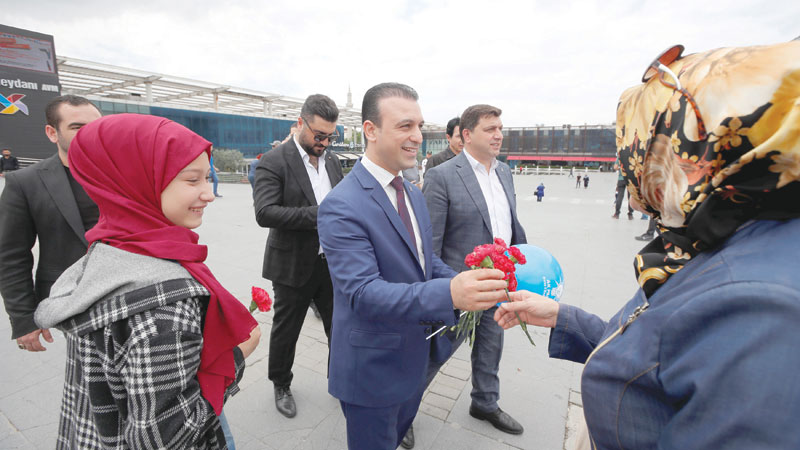

BURSA, Turkey: Millions of Syrian refugees in Turkey have no vote in elections on June 24, but if a young Syrian-born businessman running for parliament wins a seat, they will at least have a voice.
Muhammed al Sheikhouni moved to Turkey from the Syrian city of Hama 10 years ago, before conflict and the collapse of his country drove waves of his compatriots to sanctuary in their northern neighbour.
Now the head of a travel and construction firm in the industrial city of Bursa, he is a fervent admirer of President Tayyip Erdogan for his policy of welcoming displaced Syrians and is running as a candidate for the ruling AK Party.
He has also changed his name to Erdogan.
“He is proud of it, and I am proud of it,” he said in an interview at his office before heading out to campaign.
Tayyip Erdogan, Turkey’s most successful modern politician, is a polarising figure among his own people after 15 years of rule in which the country has seen strong economic growth but also arrests and purges following a failed 2016 military coup.
To many Syrian refugees, however, the president is a hero for providing shelter, food and services on a scale unmatched by any of their homeland’s other neighbours. His government says it has spent $30 billion addressing the refugee crisis.
“Turkey opened its doors to Syrians and gave them a welcome and said to them — and still says — we are your brothers, this is your country,” said Muhammed Erdogan, now 34 years old.
The welcome may be wearing thin, however. Some Turks point to the economic cost of the influx and growing communal tensions, and the AK Party’s rivals are stoking those concerns.
Muharrem Ince, presidential candidate for the opposition Republican People’s Party (CHP), criticised Erdogan last month for allowing tens of thousands of refugees to cross back into Syria for the Muslim Eid holiday — and then return to Turkey.
“Look, this is wrong — 72,000 people go for the holiday, they stay for a week or 10 days then they return,” he told CNN Turk. “If you can go there and return back, you should stay over there... This is reckless governing.”
Erdogan the parliamentary candidate plays down the criticism and tensions, and says it is time for Syrians to have a more formal voice in Turkish politics.
“Just look around you and you see all the Syrians in Turkey. There must be someone to represent them — if the Turkish people want that,” he said.
In Bursa, 140,000 Syrian refugees live alongside just under 2 million Turks, some of the more than 3.5 million Syrian refugees spread out around Turkey as a result of a conflict which has raged since 2011.
With double-digit inflation and rising costs of living, many Turks believe cheap Syrian labour has suppressed wages and increased competition for lower-skilled jobs.
The International Crisis Group said intercommunal violence between Syrians and Turks tripled in the second half of 2017.
A poll for the US policy think- tank Centre for American Progress in February found that 78 per cent of Turks believe their country spends too much money caring for refugees.
President Erdogan reassured supporters in February that Syrians would not be staying in Turkey forever, and framed military operations in northern Syria in March as a way of restoring stability so that some refugees could return.
Turkey has also built a wall along the border, reinforcing the message that the “open door” policy of the conflict’s early years has ended, and forcing tens of thousands of would-be refugees to camp on the Syrian side.
A small number of Syrians, mostly highly skilled people like doctors and teachers, have received Turkish nationality. A Turkish official said that the number was slightly more than 50,000. — Reuters
Oman Observer is now on the WhatsApp channel. Click here



